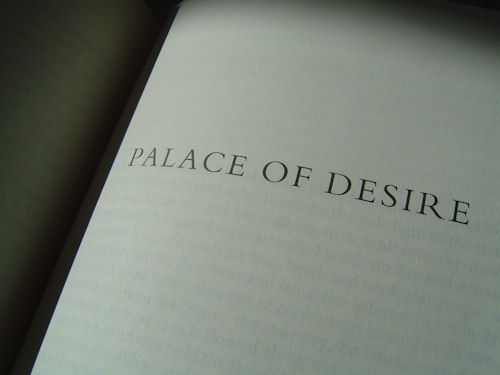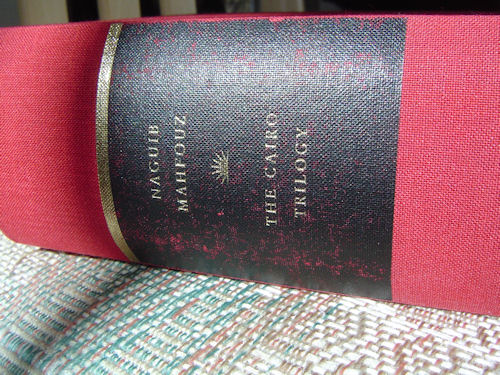 Translated by William Maynard Hutchins, Lorne M. Kenny, and Olive E. Kenny.
Translated by William Maynard Hutchins, Lorne M. Kenny, and Olive E. Kenny.
Honestly, my feelings for this trilogy so far mimic those felt among members of a big family. Sometimes you love being around them, other times you want to scream, “What the what are you doing? Stop!” but you always like (well, love) them.
Palace of Desire, the second in Naguib Mahfouz‘s Cairo Trilogy, is filled with just that: desire. How powerful it is, how it makes people act, what happens when two persons’ desires intersect. Al-Sayyid Ahmad, while slowed down by his grief and his age, is still as lustful as ever, taking a lute player as a mistress. Yasin is a man almost completely controlled by his desires and continues to chase after women no matter how many wives he’s taken and divorced. Kamal’s desire is more genuine (if over-inflated) than that of Yasin and his father. He falls for Aïda (“the beloved”), but she’s unattainable and perhaps not even that special. Some parts of his laments over her were relatable for me, but it just when on a bit too much. (I got it, she’s everything you want. And more.)
I miss the women. So much. Or maybe I just miss the coffee hour scenes, since later in the book the coffee hour has dwindled to Amina, Kamal, and Umm Hanafi. There was a scene early in the book when both Khadija and Amina’s families were over to the al-Sayyid Ahmad residence which I loved. There were even moments of true tenderness from al-Sayyid Ahmad to his grandchildren. I’m thinking that the absence of women from the novel may have to do with the Muslim precept that when women marry, they belong to their new families (I think this is correct, but if it’s not let me know!). Maybe since Khadija and Aisha married into new families, their lives don’t contribute a central component to their original family, and thus the novel. But this doesn’t really explain Amina’s absence, but perhaps her thoughts, mostly mourning Fahmy, aren’t that relevant? Also, a lot of my enjoyment (if that’s the right word…) of Palace Walk came from the thoughts of the suppressed female characters. The narrowed scope results in a somewhat less interesting narrative.
It was more prevalent in the first novel, but Mahfouz often makes some bizarre metaphors and comparisons. I noted a few while reading:
…for an argument may improve a relationship like cayenne pepper, which adds zest to food… (pg. 575)
He had been a stone with obscure inscriptions carved on it, until love had come and solved the riddle. (pg. 582)
Affection is an ancient melody but seems marvelously fresh in each new rendition. (pg. 724)
He was like a vaulter who keeps trying to go just a foot higher only to find himself soaring high into the heavens. (pg. 802)
Maybe it’s a cultural/translational thing?
While the ending of the novel is tragic, I’m very interested (and happy about it?) to see what happens next, as I assume their would be a greater focus on the women characters, especially Aisha as her life will be changing dramatically.
I read this as part of The Cairo Trilogy Readalong, hosted by Richard at Caravana de Recuerdos

I also missed the women of the family in this novel, Shannyn, and wondered the same thing as you about whether this was kind of a subtle statement by Mahfouz about the two married women belonging to another family now. Would have been nice to be able to ask him about that! I think the “bizarre metaphors,” which I often but don’t always enjoy, are Mahfouz’s tribute to an Arabic tradition of wordplay that goes back to their classical era–at least, I’ve read a work or two from that time period which are very similar in their attempts to be striking (and amusing) in that fashion. Have so little exposure to modern Arabic lit, though, that I have no idea how common a thing that would have been for Mahfouz’s contemporaries. Anyway, thanks for joining us on this one and happy reading in Book Three. Cheers!
P.S. Keep forgetting to tell you how much I love the visuals on your blog. Such lovely photos!
Yes, I was thinking it must be a cultural tradition that just wasn’t reading very well for me, probably due to both my lack of knowledge of Arabic literature and the translation (when you take something out of its natural setting, ie the Arabic language, it can lose some effect). Thanks, I’m glad you like the pictures. =)
You’ve hit upon something I also felt made this section harder to get through – the lack of the women, or more specifically, my own feelings of rooting for the suppressed female characters. Since they all but disappeared, one of the few ways I was being significantly impacted by the read also disappeared. And when they reappeared briefly, I didn’t enjoy the interaction much (Khadija made me crazy!) I too am looking forward to the next section and hoping for more from the women in the story.
Yes! Except I like Khaija’s sections, annoying as she may act, it’s interesting to see how she reacts in her new family and how she alters that behavior in the presence of her father. Even though she has more freedom now, she’s still completely submissive to him. I didn’t like the Amina sections though.
Looking at the picture of your book — I’m curious if this is the new Everyman edition but without the dust jacket? I’m reading the individual books.
Anyway, I agree with you that most of the female characters were in the foreground with this installment. I hope that Mahfouz doesn’t treat Aisha as an afterthought in the final part; I’m also curious to see if Kamal will continue to stay in touch with Aida.
Idioms in any language are hard to translate; so it seems here as well!
Yes, my edition is the Everyman. I bought it a few years ago used and without the dust jacket, so it’s a little beat up on the spine. =)
Yes, I hope to see more of Aisha especially in the next book!
Hi admin do you need unlimited content for your site ?
What if you could copy article from other websites, make it pass copyscape test and publish on your
blog – i know the right tool for you, just search in google:
kisamtai’s article tool